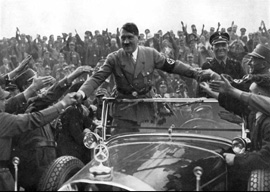
June 28, 2011

Adolf Hitler
But I suspect that if he had spoken well of almost any other mass-murdering maniac in history—Stalin, Ted Bundy, Vlad the Impaler, you name it—the board would have defended the Danish enfant terrible on free-expression grounds. Perhaps they would have even lauded his commitment to being “transgressive” or “edgy” or some other fashionable buzzword that invariably gets trotted out when an artist does or says something indefensibly dumb.
But as with Cameron Diaz’s Mary, there’s something about Adolf, isn’t there?
A little perspective is in order. Mao Tse-Tung is believed to be responsible for the deaths of anywhere from 40-70 million people. Even assuming that the lowball figure is correct, that’s quite a feat. In whatever corner of hell he and Hitler are currently breaking concrete with sledgehammers, Adolf is probably either feeling like an underachiever or giving Mao a fist bump and a “Respect, G.” Yet praise for Mao as a great visionary leader has been weirdly commonplace in recent history, notably in the figure of former White House Communications Director Anita Dunn. Admittedly, she was forced to resign after she praised Mao during a high-school graduation ceremony. But the fact she ever thought it remotely appropriate speaks volumes about our inequitable standards in deciding which mass murderers are acceptable to praise. Try to imagine giving a high-school graduation speech that mentions Hitler, even ironically, as an inspiring figure for young graduates to emulate. Even G. W. Bush wouldn’t have been that tone-deaf to common mores when speaking in public.
American academic and standup comic Noam Chomsky has notoriously defended Pol Pot’s genocidal regime on a number of occasions. (This would appear to have some strange self-flagellating wish-fulfillment subtext for Chomsky, seeing as the Khmer Rouge was known for slaughtering intellectuals, academics, and even anybody who merely looked smart by virtue of wearing glasses). Che Guevara didn’t live long enough to achieve the impressive Stalin/Hitler body count he was probably gunning for, but he still killed enough people that you might be forgiven for wondering why every Hollywood hunk from Benicio Del Toro to Gael Garcia Bernal seems to be lining up to play him in ponderous biopics.
Examples of the public’s indifference toward fawning praise of homicidal maniacs doesn’t end with epic-level political murderers. Axl Rose used to wear Charles Manson T-shirts in concert and got his band to record one of the cult leader’s tunes. But so far as I know, the only thing that killed Axl’s career was the fact that he looked even stupider in cornrows than any other white person in history who’s looked stupid in cornrows. His open admiration for a man who convinced his followers to stab a pregnant woman 16 times and slosh around in her blood like demented kindergarteners appears to have had little to do with the matter.
It’s too early to tell if the likes of Von Trier or Galliano will suffer from permanent reputation demolition as a result of their ill-considered outbursts. But in the meantime, it seems reasonable to demand that there be a coherent punitive standard applied to those who say dumb things in defense of murderers, tyrants, despots, cult leaders, or sundry resentful short men with complexes. Either singing killers’ praises (ironically or not) is deeply immoral or it isn’t. And either free speech protects the right to say irresponsible and unpleasant things or it doesn’t. If nothing else, having a solid rule in place about this sort of thing might help prevent the Cannes Film Festival board from uttering any more idiotic public statements.